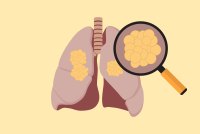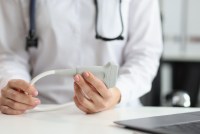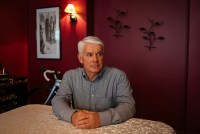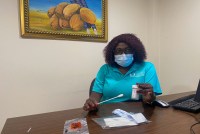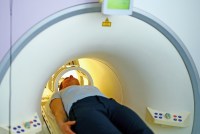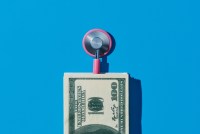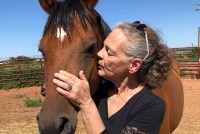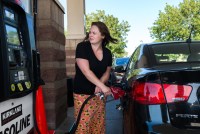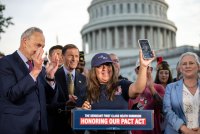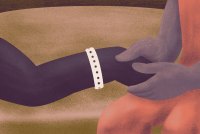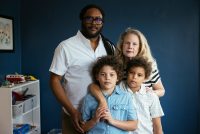Latest KFF Health News Stories
Racial Disparities in Lung Cancer Start With Research
Improving lung cancer outcomes in Black communities will take more than lowering the screening age, experts say. Disparities are present in everything from the studies that inform when people should get checked to the availability of care in rural areas.
Readers and Tweeters Decry Medical Billing Errors, Price-Gouging, and Barriers to Benefits
KHN gives readers a chance to comment on a recent batch of stories.
Pese al consejo de Katie Couric, médicos dicen que las ecografías de seno pueden no ser necesarias
Expertos advierten sobre los falsos positivos que puede generar más temor que certezas médicas.
Despite Katie Couric’s Advice, Doctors Say Ultrasound Breast Exams May Not Be Needed
When Katie Couric announced she had breast cancer, she urged women to get a mammogram — and, if they have dense breasts, to get supplemental screening by ultrasound. But medical experts point out that ultrasound and other auxiliary screenings haven’t been proven to do more than regular mammography in reducing mortality.
$38,398 for a Single Shot of a Very Old Cancer Drug
Lupron, a drug patented half a century ago, treats advanced prostate cancer. It’s sold to physicians for $260 in the U.K. and administered at no charge. Why are U.S. hospitals — which may pay nearly as little for the drug — charging so much more to administer it?
Miami’s Little Haiti Joins Global Effort to End Cervical Cancer
Creole-speaking public health workers teach women how to test themselves for HPV, the virus that causes some cervical cancers.
Reporter Follows Up on ‘Cancer Moonshot’ Progress and the Bias in Digital Health Records
KHN and California Healthline staff made the rounds on national and local media this week to discuss their stories. Here’s a collection of their appearances.
La última década ha sido testigo de una rápida expansión de las pruebas genéticas. Pero, ¿cuál es su real relevancia clínica?
Genetic Tests Create Treatment Opportunities and Confusion for Breast Cancer Patients
Doctors are divided on whether blanket testing of breast cancer patients is warranted, since scientists and physicians are sometimes unsure about how to interpret the results.
New Abortion Laws Jeopardize Cancer Treatment for Pregnant Patients
As abortion restrictions take effect across the South in the wake of the Supreme Court’s decision to overturn Roe v. Wade, cancer doctors are trying to decipher the laws. They’re grappling with how to discuss options with pregnant patients, who may be forced to choose whether to proceed or forgo lifesaving cancer treatments that can prove toxic for the fetus.
Many Preventive Medical Services Cost Patients Nothing. Will a Texas Court Decision Change That?
A federal judge in Texas issued a decision this week that affects the Affordable Care Act. It says one way that preventive services are selected for no-cost coverage is unconstitutional.
Rural Americans Have Difficulty Accessing a Promising Cancer Treatment
Chimeric antigen receptor T-cell therapy has eliminated tumors in some late-stage cancer patients, but the cost and complexity of care mean rural Americans have trouble accessing the treatment.
The $18,000 Breast Biopsy: When Having Insurance Costs You a Bundle
An online calculator told a young woman that a procedure to rule out cancer would cost an uninsured person about $1,400. Instead, the hospital initially charged almost $18,000 and, with her high-deductible health insurance, she owed more than $5,000.
Sleepless Nights Over Her Children’s Future as Debts Pile Up
Jeni Rae Peters, 44, Rapid City, South Dakota Approximate Medical Debt: More than $30,000 Medical Issue: Breast cancer What Happened: Jeni Rae Peters’ budget has always been tight. But Peters, a single mom and mental health counselor, has worked to provide opportunities for her children, including two girls she adopted and a succession of foster […]
Para las familias médicamente vulnerables, la presión de la inflación es inevitable
Para millones de familias que viven con enfermedades crónicas, trastornos cardíacos, diabetes y cáncer, u otras condiciones debilitantes, la inflación está demostrando ser un doloroso flagelo que podría perjudicar su salud.
For Medically Vulnerable Families, Inflation’s Squeeze Is Inescapable
Inflation hasn’t hit Americans like this in decades. And families living with chronic diseases have little choice but to pay more for the medicine, supplies, and food they need to stay healthy.
After ‘a Lot of Doors Shut in Our Face,’ Crusading Couple Celebrate Passage of Burn Pit Bill
Le Roy and Rosie Torres founded the Burn Pits 360 group that advocated for years for Congress to help veterans suffering from injuries caused by the massive disposal sites on overseas bases. Le Roy came home from Iraq suffering from breathing problems.
Hospices Have Become Big Business for Private Equity Firms, Raising Concerns About End-of-Life Care
Private equity firms are seeing opportunities for profit in hospice care, once the domain of nonprofit organizations. The investment companies are transforming the industry — and might be jeopardizing patient care — in the process.
In America, Cancer Patients Endure Debt on Top of Disease
Medical breakthroughs mean cancer is less likely to kill, but survival can come at an extraordinary cost as patients drain savings, declare bankruptcy, or lose their homes, a KHN-NPR investigation finds.
Más de 100 millones de estadounidenses viven acosados por las deudas médicas
La investigación revela un problema mucho más extendido de lo que se había informado anteriormente. Esto se debe a que gran parte de la deuda que acumulan los pacientes figura como saldos de tarjetas de crédito, préstamos familiares o planes de pago a hospitales y otros proveedores médicos.



